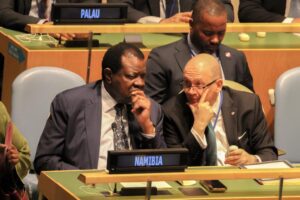
By:Justicia Shipena
According to analyst Henning Melber, a new issue for Namibia at the UNGA will be mineral resources, specifically green hydrogen, and Namibia’s ambitions to become the continent’s energy hub.
More than 140 world leaders, including President Hage Geingob, are convening at the UNGA this week to discuss critical global issues under the subject “Accelerating the recovery from coronavirus disease and full implementation of the 2030 Agenda for Sustainable Development at all levels”.
“Given the fossil fuel explorations it also requires clarification to which extent Namibia is willing to support the efforts to reduce CO2 emissions by not producing fossil energy, and thereby contributing to facing the challenges posed by climate change,” Melber said, who also doubles as political scientist and sociologist.
He indicated climate change is an issue threatening Namibia’s water supplies and food production, stressing that nearly half of Namibia’s population will be dependent on food supply.
Melber stated that, like in previous years, he [Geingob] will deliver a speech to the Assembly, and that, while certain things have remained the same, others have changed significantly.
He explained that global polarisation has intensified, and that member states’ statements will be carefully scrutinised to see where they have moved and where they are leaning.
In this line, he alluded to the position of neutral member states in the present crisis, which he says would necessitate some testing different subtleties than his most recent affirmations of being a friend and ally of Russia.
Namibiaabstained with 15 other African states on the vote against Russia’s invasion of Ukraine last year. Article 96 outlines the country’s foreign policy principles, based on non-alignment. But it stresses adherence to fundamental value-based norms in the international system. This framework does not condone warfare, invasion, occupation, or any other denial of the right to self-determination of people in sovereign states. President Geingob has confirmed such understanding.
Melber stated that, as to be expected, he [Geingob] would once again express sympathy for the Palestinian people occupied by Israel under the apartheid government and the independence of Western Sahara. The question is whether Geingob is prepared to explicitly criticise Russia’s invasion and occupation of Ukraine, he added.
“It needs no prophetic skills to assume that he will be reluctant to do so. He might refer to the last efforts of BRICS and the realignment in the global South. But again the question remains which side are you on when it comes to the violation of fundamental principles of the UN Charter,” he indicated.
Namibia, like every other country, will be assessed against that, according to Melber.
The UN Charter is the founding document of the United Nations, an intergovernmental organisation. Article one of the charter states that world peace and security must be maintained.
Melber stated that the Western World’s imperialist history and the present should not be used to accuse other countries of applying similar double standards when criticising the West but refusing to criticise comparable crimes by other governments.
As a result, he contends that the conflict in Ukraine has reduced grain and other food exports, particularly to African nations. This, he states, raises the question of how far Namibia and Geingob are ready to go in opposing an unlawful war.
During a side event at the UNGA, President Geingob stated that the effects of climate change are now clearly visible, with droughts and floods becoming more intense, out-of-season storms, intense wildfires and subsequent flooding, unprecedented heat waves, glacier melting, and rising ocean levels.
He emphasised that the necessary investment is required to address climate change and related water cycle features, saying access to finance becomes more constrained and expensive for Namibiawhich is classified as a middle-income country.
“The proposal to step up domestic financial resources is pivotal, but by no means the silver bullet solving everything. We are facing a global crisis which requires global solutions, including the financial needs for the water agenda,” Geingob said.
Namibia has received a loan of N$1.9 billion from the African Development Bank, while development partners such as German Development Bank (KfW) has pledged a loan and grant of 125 million Euro.
Despite this, Geingob stated that severe gaps in water infrastructure investment and funding still exist.
Simultaneously, Geingob underlined Namibia’s ability to develop clean energy sources.
SDGs NOT ON TRACK -UN
Meanwhile, UN Secretary-General António Guterres said that the global humanitarian system is on the point of collapsing.
Needs are increasing, but financing is dwindling.
He emphasised that the United Nations’ humanitarian missions are being compelled to make drastic cutbacks.
At the same time, Guterres stated that the peace and security architecture is under unprecedented strain.
He then urged member countries to recommit to a world free of nuclear weapons and to put a halt to the deterioration of the nuclear disarmament and arms control regime.
“Calling for a broad-based reflection on peacekeeping and make it nimbler and more adaptable, with forward-looking transition and exit strategies from the start.”
He went on to say that although climate disaster is setting new records, the world cannot afford to keep repeating the same old failed record of scapegoating and waiting for others to move first.
“And to all those working, marching and championing real climate action, I want you to know that you are on the right side of history and that I am with you.”
At the same time, the UN has said that just 15% of the Sustainable Development Goals (SDGs) targets are on track, urging key parties to intervene to save the goals.
The list of 17 SDGs, which contains 169 specific objectives, was initially agreed as a path to address a range of challenging global challenges by 2030 at the UN Sustainable Development Summit in September 2015.









Comments